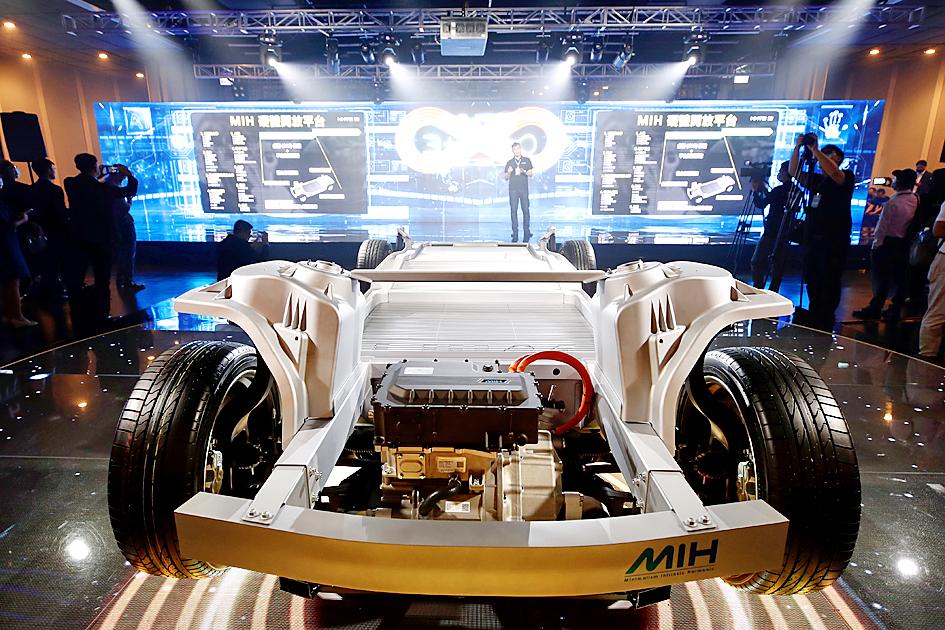India’s Tata Technologies Ltd has become the latest member of Hon Hai Precision Industry Co’s (鴻海精密) MIH Open Platform to jointly develop sustainable mobility solutions for customers worldwide, the Taiwanese company said yesterday.
It might include embedded and electrical, electric platform development and battery management system solutions, among others, Hon Hai said.
Tata Technologies’ participation marks more progress in Hon Hai’s efforts to expand its electric-vehicle (EV) ecosystem through the MIH platform, it said.

Photo: RITCHIE B. TONGO, EPA-EFE
The open platform has about 2,380 members around the world, with an aim to jointly develop EV ecosystems and shrink the time to market for products.
Hon Hai made the announcement on Facebook and posted photographs, with one showing MIH Consortium chief executive officer Jack Cheng (鄭顯聰) shaking hands with Tata Technologies CEO Warren Harris.
Hon Hai signed the contract with Tata Technologies to join the platform at the Indian company’s office in Detroit, Michigan.
Hon Hai said it is on track to ship its first microprocessors and other chips used in EVs by 2024.
The company would supply chips for its EV customers and for original electronic manufacturers, said Gene Liu (劉錦勳), vice president of Hon Hai’s SoC Design Center.
Liu declined to comment on the company’s progress in collaboration with Stellantis NV on new vehicle chips.
Hon Hai has set a three-year goal to boost its revenue from EVs and related components to NT$1 trillion (US$33.69 billion), and for EV shipments to reach 500,000 to 750,000 units a year in 2025.
The company this year is to make electric light-duty trucks for Lordstown Motors Corp, which is based in Ohio, and produce EVs for Fisker Inc in the fourth quarter next year.

Shares in Taiwan closed at a new high yesterday, the first trading day of the new year, as contract chipmaker Taiwan Semiconductor Manufacturing Co (TSMC, 台積電) continued to break records amid an artificial intelligence (AI) boom, dealers said. The TAIEX closed up 386.21 points, or 1.33 percent, at 29,349.81, with turnover totaling NT$648.844 billion (US$20.65 billion). “Judging from a stronger Taiwan dollar against the US dollar, I think foreign institutional investors returned from the holidays and brought funds into the local market,” Concord Securities Co (康和證券) analyst Kerry Huang (黃志祺) said. “Foreign investors just rebuilt their positions with TSMC as their top target,

REVENUE PERFORMANCE: Cloud and network products, and electronic components saw strong increases, while smart consumer electronics and computing products fell Hon Hai Precision Industry Co (鴻海精密) yesterday posted 26.51 percent quarterly growth in revenue for last quarter to NT$2.6 trillion (US$82.44 billion), the strongest on record for the period and above expectations, but the company forecast a slight revenue dip this quarter due to seasonal factors. On an annual basis, revenue last quarter grew 22.07 percent, the company said. Analysts on average estimated about NT$2.4 trillion increase. Hon Hai, which assembles servers for Nvidia Corp and iPhones for Apple Inc, is expanding its capacity in the US, adding artificial intelligence (AI) server production in Wisconsin and Texas, where it operates established campuses. This

H200 CHIPS: A source said that Nvidia has asked the Taiwanese company to begin production of additional chips and work is expected to start in the second quarter Nvidia Corp is scrambling to meet demand for its H200 artificial intelligence (AI) chips from Chinese technology companies and has approached contract manufacturer Taiwan Semiconductor Manufacturing Co (TSMC, 台積電) to ramp up production, sources said. Chinese technology companies have placed orders for more than 2 million H200 chips for this year, while Nvidia holds just 700,000 units in stock, two of the people said. The exact additional volume Nvidia intends to order from TSMC remains unclear, they said. A third source said that Nvidia has asked TSMC to begin production of the additional chips and work is expected to start in the second

US President Donald Trump on Friday blocked US photonics firm HieFo Corp’s US$3 million acquisition of assets in New Jersey-based aerospace and defense specialist Emcore Corp, citing national security and China-related concerns. In an order released by the White House, Trump said HieFo was “controlled by a citizen of the People’s Republic of China” and that its 2024 acquisition of Emcore’s businesses led the US president to believe that it might “take action that threatens to impair the national security of the United States.” The order did not name the person or detail Trump’s concerns. “The Transaction is hereby prohibited,”